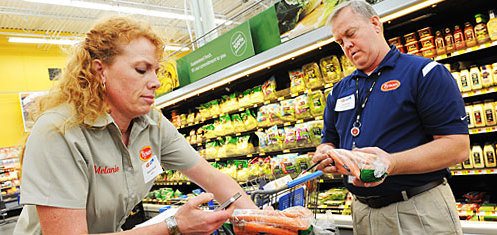Tyson Foods CEO looking to lead company through its scale
by April 18, 2017 9:51 pm 989 views

“Big food needs to lead.”
That may be the clarion call for new Tyson Foods CEO Tom Hayes, who spoke in Little Rock on Tuesday.
Hayes told a crowd of several hundred at the Arkansas Economic Development Foundation (AEDF) fundraising luncheon at the Statehouse Convention Center that the Springdale-based protein giant can use its scale to provide solutions to nutrition and sustainability, consumer preferences, and community issues that revolve around food security.
“We’re not just a poultry company. We are a food company,” Hayes said. “The world is moving fast. It’s not standing still.”
Hayes outlined the economic impact Tyson Foods has in Arkansas. Not only is it headquartered in Northwest Arkansas, Tyson employs about 24,000 workers in the Natural State and Hayes said that jobs with the company in areas like refrigeration technicians, transportation, and environmental health can pay in the $50,000-$70,000 per year range.
The New Hampshire native who was installed as CEO in January 2017 said Arkansas is a small state like where he grew up. Hayes said Arkansans are friendly and embracing and he’s enjoyed involving himself in the community despite his worldwide role.
Barely over 100 days on the new job, Hayes spoke exclusively with Talk Business & Politics following the AEDF luncheon and pointed to his early accomplishments as CEO. He touted building on the success of his predecessor Donnie Smith, who helped return Tyson Foods to profitability.
Hayes said he’s installed new leadership in key management roles and reset the brand with a new logo and a mission to expand in the prepared foods sector.
“…Driving those things are going to make us even more focused on growth,” he said.
Tyson is deploying a strategy to take profits from its sometimes volatile commodities divisions and invest them in its effort to grow its prepared foods sector. When asked if Tyson Foods may eventually lean more heavily on its prepared foods business, Hayes said he thinks of the business in “two halves.”
“Actually, the commodity business in the first quarter had done really, really well, continues to do well, and that does provide us cash flow to drive into those things that are going to be more branded focus and a little more value added, I’d say.
“So the reason why that’s so important for us is that the commodity businesses will have their cycles, so they’ll go up and down, and the value added businesses tend to be a more of a steady trajectory of growing. It’s important for us to focus on both, we do both really well, but to make sure we’re making the right investments in the value added business,” he said.
“We want to grow all parts of our business so we are investing heavily in chicken and prepared, so those two I would say continue to see us grow those. If in fact the commodity businesses stay right about where they are, probably more over time you’d see more growth there, so that could be a possibility,” Hayes added.
Tuesday’s luncheon, which was a joint event by the AEDF and the Arkansas Industrial and Economic Development Foundation (AIEDF), raises money to benefit economic development efforts in Arkansas through activities such as research, site visits and recruitment support. It is affliated with the Arkansas Economic Development Commission.
